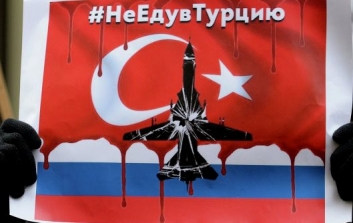Minsk anticipates becoming negotiations platform for de-escalation of tension between the Kremlin and Ankara
 The situation has not changed
The situation has not changed

Minsk officials have not expressly supported the Kremlin, rather adopted a neutral peacekeeping attitude in Russian-Turkish confrontation. The Belarusian authorities hope to engage in the negotiation process over the de-escalation of tension between Moscow and Ankara. Apparently, Minsk is attempting to convince the Kremlin to adopt a compromise as regards the Russian military air base in Belarus by proposing the joint command within the United Group Alignment of the Union State.
President Lukashenka’s official visit to Russia and the meeting between the Belarusian and Russian presidents has been postponed. While official statements referred to the workload of both presidents, Belarusian analysts believe that the Kremlin postponed Lukashenka’s visit to Moscow.
The CSTO press statement in regard to the downed Russian fighter by Turkish bomber issued after an emergency meeting of the CSTO Permanent Council, reflected Moscow’s stance, “The incident is regarded as a flagrant violation of the international law with the most serious consequences, a direct violation of the Memorandum on the prevention of accidents and safety flights over Syrian Arab Republic, signed with the United States and applied to all coalition countries, including Turkey”.
However, other CSTO member states, including Belarus, were silent or made neutral statements about the Russian fighter jet downed in Syria. Belarus has not supported her closest ally directly: Belarusian Foreign Ministry Spokesperson Mironchik said that both sides should show restraint and join efforts to de-escalate the tension. “Such tragic and very dangerous incidents cause deep regret and extreme concern. Especially when they occur in a region where a bloody armed confrontation is already ongoing for several years, and when sides in such incidents are brotherly Russia and friendly Turkey”, he said.
That said, instead of meeting with President Lukashenka, Vladimir Putin met Azerbaijani President Ilham Aliyev, whose visit was originally planned for 2016. Analysts point out that potentially a ‘tandem of peacekeepers’ is being formed by Belarus and Azerbaijan to facilitate the reconciliation between Moscow and Ankara. Minsk and Baku, which have friendly relations with both, Russian and Turkish leaders, seem as most appropriate intermediaries for both sides in the confrontation in order to lead the negotiation process to de-escalate tensions. President Lukashenka is regarded as the most loyal ally of the Kremlin, and President of Azerbaijan Ilham Aliyev has stronger ties with Ankara.
State Secretary of the Union State of Belarus and Russia Grigory Rapota has confirmed that Minsk might be used as a platform for negotiations between the Russian and Turkish leaders, “Belarus may be a convenient platform for any kind of dialogue aimed at stabilizing and peacemaking, including negotiations about the situation in the Middle East”.
Some Belarusian and Russian analysts say that the Kremlin will continue to increase its military presence at the border with NATO member countries, which will lead to increased pressure on the Belarusian leadership by Russia regarding the deployment of the Russian military air base in Bobruisk. Director of Operations of the Main Command of Air and Space Forces of Russia Alexander Lyapkin announced that composition and organisational structure of the Russian air base in Belarus had been approved: “Airport ‘Bobruisk’ will host one aviation squadron of fighter jets (12 combat aircrafts) and a helicopter unit (4 military transport helicopters Mi-8)”. Meanwhile, the Belarusian Defence Ministry has refused to comment on the Russian air base deployment plans.
Yet General Lyapkin’s statement could be only the Kremlin’s attempt to ‘calm down’ Russian society and demonstrate the existence of foreign allies and success in promoting Russian interests in the ‘near abroad’, after a ‘weak’, according to the Russian society, reaction to the downed Russian Su-24 by the Turkish Air Force from the Russian government. Nevertheless, it is clear that Russia’s expectations with respect to the air base have lowered – now they are talking only about 12 combat aircrafts instead of initially mentioned 24.
Finally, Belarus’ need for financial assistance prompts her to demonstrate compliance to the Kremlin’s requirements, while insisting on a compromise.
Subscribe to our newsletter




Situation in Belarus
Constitutional referendum: main consequences


 Video
Video
How to count the political prisoners: are the new criteria needed?


 Video
Video
Paternalism In Decline, Belarusian Euroscepticism, And The Influence Of Russia


 Video
Video












